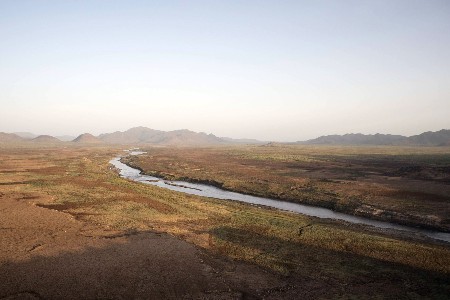June 5, 2020 – Back in 2013 I presented a three-part series on Africa’s rivers writing about the impact of anthropogenic climate change on freshwater resource capacity across the continent. Today, the Nile River has become the centre of a growing confrontation among the nations that share the watershed. As you can imagine, a river that winds some 6,850 kilometers (4,150 miles) and touches seven nations is bound to lead to conflicting demands for water rights. The most contentious is the one right now between Egypt and Ethiopia. The latter is the source of the Blue Nile, the river’s largest tributary and the provider of the greatest amount of water volume throughout its course. The former is on the receiving end relying on the water for its agriculture and cities. And to complicate things further there is a cultural divide from Sub-Saharan Ethiopia and North African Egypt, a racial divide between Nilotic peoples and Arabs, and a religious divide between Christians and Muslims.
Ethiopia has been undergoing a renaissance under new leadership and a government that is no longer under the thumb of the military and single-party rule. This renaissance includes the harnessing of the Blue Nile for Ethiopia’s 109 million people to improve freshwater access for crops and cities, and to generate 6,450 Megawatts of hydroelectricity to power homes and industry.
Known as the Grand Ethiopian Renaissance Dam (GERD), it lies just 30 kilometers to the east of the Sudan border and was started in 2011. The dam today is nearing completion and the reservoir behind it will take up to 10 years to fill. It is currently the largest hydroelectric project in Africa and will hold back 1.6 years of Blue Nile water flow on average.
It is the last fact that is of immediate concern to Ethiopia’s neighbours. Both Egypt and Sudan rely on the annual cycle of the Nile River running throughout their countries, and the Blue Nile provides more freshwater than the main branch. The animosity of Ethiopia’s nieghbours has gotten so intense of late that there have been reported clashes between neighbouring armies. There is even talk of Egypt establishing a military base in neighbouring South Sudan from which it could conceivably launch an offensive into Ethiopia.
So water wars are moving into the present whether we are describing confrontations over the Colorado River between Mexico and the United States, or the tension between Canada and the United States over diverting water from the Great Lakes to an increasingly parched mid and southwest, or China in conflict with India, Nepal, Bhutan, Vietnam, Laos, Cambodia, Thailand and Myanmar over the damming of freshwater sources in the Himalayas. Even India and China are reporting tussles along the border between their troops. Could securing freshwater be one of the reasons?
Egypt is accusing Ethiopia of “hydro-hegemony” according to a recent article published in The Guardian. Sudan originally supported the dam and now has switched back to Egypt even though Ethiopia has offered it access to the low electricity rates from GERD. The electricity Ethiopia would produce would replace what the country gets from Egypt’s 2,100 Megawatt Aswan Dam. So this becomes another point of contention between the countries.
The loss of a paying customer isn’t the only reason Egyptians are talking about war. There is a fear that the Egyptian parts of the Nile will no longer experience annual flooding that restores fertility to farms in the Delta and lower reaches of the river. To irrigate adjacent fields with lower post-Monsoon river levels, Egyptian farmers will need to pump Nile water to feed the crops. The downstream impact will mean higher fuel costs for irrigation and the potential of drought conditions when river levels drop. This latter issue is already a growing concern in the age of climate change with the Nile River valley experiencing increasing periods of prolonged drought. Today, 10% of the population faces freshwater scarcity. Climate scientists predict that by 2040 that number will grow to 35% and represent 80 million people.
Right now the freshwater wars on the Sudan-Ethiopian border are limited to skirmishes. But one can imagine an escalation as the lake behind GERD fills to maximum capacity with downstream consequences for Ethiopia’s neighbours.









